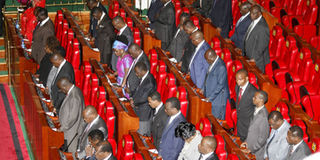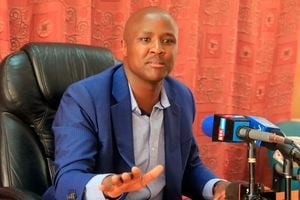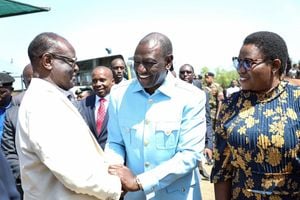Fear of budget crisis as MPs take Christmas break

MPs in the newly refurbished Chambers during the official opening at Parliament Buildings August 7, 2012. MPs are yet to pass three key Bills – Supplementary Budget, the County Allocation of Revenue Bill and the Division of Revenue Bill – that would ensure that the next government and the 47 counties have enough money to function soon after the next General Election.
What you need to know:
- House yet to pass three key Bills that will ensure government and the 47 counties have enough money to run soon after the next General Election
The Tenth Parliament is scheduled to take its Christmas and New Year break —possibly the final one — on Thursday.
However, MPs are yet to pass three key Bills – Supplementary Budget, the County Allocation of Revenue Bill and the Division of Revenue Bill – that would ensure that the next government and the 47 counties have enough money to function soon after the next General Election.
The MPs also have to deal with the Budget Policy Statement.
Insiders in the Parliamentary Budget Office and the Budget Committee are worried that because the General Election is coming up on March 4, 2013, there will be no time for the next Parliament to prepare the budget.
Budget Committee chairman Elias Mbau is of the view that if those Bills are not approved within the next three sitting days, then the next government – national and county – will be crippled.
“There is no time for committees to make input in this process. When I look at the calendar, if MPs would be kind enough we can have more sittings, but the days left cannot be enough… If we don’t prosecute this agenda, we are staring at a crisis as far as funding crucial government expenditure is concerned,” he said.
Mr Mbau, in his plea to Speaker Kenneth Marende and Leader of Government Business last on Thursday afternoon, said the Treasury ought to submit the documents on Tuesday if Parliament is to avert a budget crisis.
Next year’s budget estimates are also among the things the MPs want to approve before the expiry of their term.
The Constitution dictates that the three Bills and the policy paper should be with the House two months before the end of the Financial Year – latest April 30.
The Supplementary Budget is a top-up budget for the current financial year.
The Division of Revenue Bill is supposed to divide revenue raised by the national government among the national and county levels of government and ensure that not less than 15 per cent of the revenues is sent to the devolved units.
The County Allocation of Revenue Bill is to divide among the counties the revenue allocated to the county level of government on the basis of the recommendations from the Commission on Revenue Allocation.
The Speaker said there was “danger” if the House did not do the job before the holidays. According to him, the House might fail to sit after January 4 because some of the MPs will no longer show up as they would have quit the parties that sponsored them to the House.
Deputy Leader of Government Business Amos Kimunya said the Treasury was working on the papers and should submit the documents on Tuesday.
Term ends
The term of the Tenth Parliament officially expires on January 14, 2013. But if the House fails to seat sufficient numbers – at least 148 MPs – then there would be no point of them sitting.
Constitutional Bills require a minimum of 148 MPs – two-thirds of the House – and it would therefore be futile to have a House that cannot do everything it ought to.
The quorum of Parliament is 30 MPs. But lately MPs have been skipping House sittings for the campaign trail. The highest number of MPs that have attended the proceedings since they returned from recess on November 20 is 35.
The Tenth Parliament will go down in history as the most hardworking because it not only ensured that the country came out of the political crisis after the botched 2007 elections; it is also the House that approved Kenya’s two-year-old Constitution and also ensured that the country got the laws to ensure the Constitution became a reality.
So far, the Tenth Parliament has approved 173 Bills in the five years that it has been in session.
This will also be the first time the Speaker will audit the performance of individual MPs and the committees of the House.
It is hoped that these results will be made public once the audit is done — possibly before the election — to allow the public to vet those people eligible for re-election.




